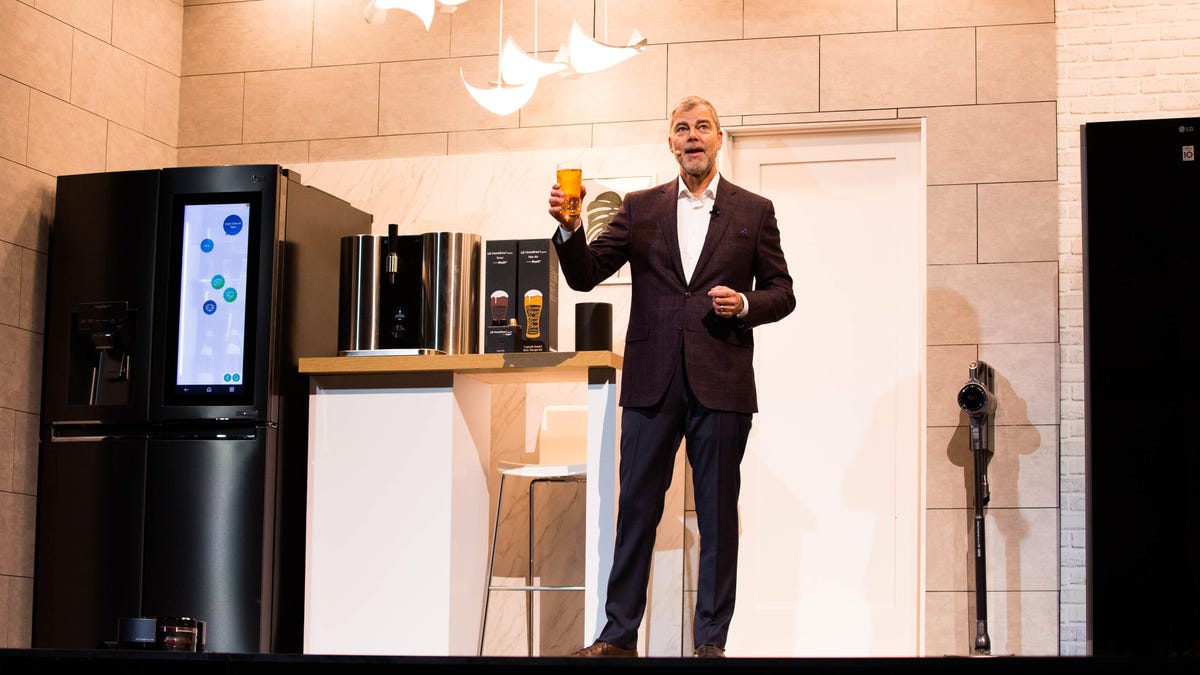At CES 2019, LG on juggling AI smarts and protecting our personal data
LG is betting consumers want personalized recommendations from their devices.

LG executive David Vanderwaal shows off a homebrew machine and talks AI.
For the past two years, LG has talked up the prospects of artificial intelligence. At CES 2019, the company pushed its ThinQ AI platform forward by allowing it to give you personalized recommendations based on your usage pattern.
But that means collecting your data at a time when consumers are waking up to the fact that tech companies have been exploiting our personal information -- sometimes with disastrous results.
David Vanderwaal, senior vice president of marketing for LG Electronics' US arm, as well as the main presenter at today's CES 2019 press conference, helped break down how the company's AI platform works, the issue of data privacy and why consumers should care.
The following is an edited transcript of our interview.
Q: What the heck LG ThinQ?
Vanderwaal: LG ThinQ is our artificial intelligence platform that allows not just individual devices to react to commands, but also takes user data, lifestyle data, and pulls them together to make consumers' lives easier and more enjoyable.
So how does this work?
LG's vision for AI takes what we call lifestyle data, and that's going to allow us to look at things like how our products are used in the home. For example, what television shows you watch, how often you do laundry, what type of clothes do you wash, how often do you clean your home. All those are combined with both internal and outside environmental factors to learn what users' specific circumstances really are, and from there, offer proactive suggestions based on that user's lifestyle.
Does that mean you're collecting our data?
With LG, data privacy is extremely important to us, so the way that we're protecting it is in a hybrid manner. So, their individual usage of that device is stored on the device only. But the aggregated data of how users use the device altogether is stored on a cloud. So always privacy is protected for the individual consumer.
How else is LG protecting our information?
Consumer data and the privacy to it is extremely important to LG. Everything is opt in.
Why should consumers care about AI?
The challenge with all of us who are trying to explain artificial intelligence to consumers is what are the benefits? We'll use a lot of use cases to actually show consumers what kind of lifestyle benefits they'll see when they use artificial intelligence.
Like what?
A great example of ThinQ platform is understanding that a consumer washes clothes every Saturday. By knowing every Saturday, the AI platform, called LG ThinQ, is gradually accumulating what the behavior is and offering suggestions for how to get better washing.
Is this all just a gimmick?
With LG, we're trying to make artificial intelligence relevant. Because right now, there's a lot of artificial intelligence that consumers are using and not even knowing it. So we're trying to make it simple to understand and show the benefits of why artificial intelligence will help products. And to communicate the idea of products communicating with one another.
CES 2019: See all of CNET's coverage of the year's biggest tech show.
CES schedule: It's six days of jam-packed events. Here's what to expect.

